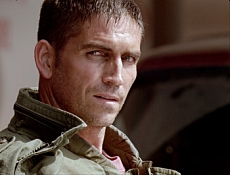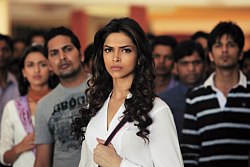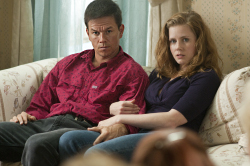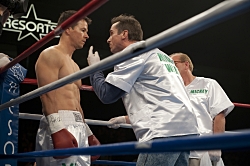Interview with Jim Caviezel (Carroll Oerstadt)
Denzel Washington’s Interview (Detective Doug Carlin)
 Paula Patton’s Interview (Claire Kuchever)
Paula Patton’s Interview (Claire Kuchever)
 Val Kilmer’s Interview (Agent Pryzwarra)
Val Kilmer’s Interview (Agent Pryzwarra)
 Jim Caviezel’s Interview (Carroll Oerstadt)
Jim Caviezel’s Interview (Carroll Oerstadt)
 Tony Scott’s Interview (Director)
Tony Scott’s Interview (Director)
 Jerry Bruckheimer’s Interview (Producer)
Jerry Bruckheimer’s Interview (Producer)
Popular on LondonNet
 Jim Caviezel — best known for playing Jesus in The Passion of the Christ — makes a dramatic about face in his new film, the action thriller Deja Vu, in which he plays a home grown American terrorist who sees the innocent casualties of his carefully planned atrocities as collateral damage. Produced and directed by the powerhouse duo of Jerry Bruckheimer (Pirates of the Caribbean and National Treasure, among many others) and Tony Scott (Enemy of the State), Deja Vu stars Denzel Washington as Doug Carlin of the U.S. Bureau of Alcohol, Tobacco and Firearms. Carlin and the ATF are called in to investigate a cataclysmic explosion on a New Orleans ferry. With the help of a group of braniac scientists working on the outer edges of modern physics and the latest theories of time travel, Carlin gets the once-in-a-lifetime chance to prevent a crime that has already happened. It’s not often that a Hollywood film takes time out to explain the basics of String Theory. Since 21st century physics apparently justifies Tony Scott in ensnaring Denzel Washington in a car chase that is simultaneously happening right this minute and four days ago, the science lesson turns out to be fun. “I love that Deja Vu is a film that tackles both the seen and unseen,” says Caviezel, who makes a worthy opponent for Denzel Washington and gives a performance characterized by the haunting intensity that is rapidly becoming the actor’s trademark.
Jim Caviezel — best known for playing Jesus in The Passion of the Christ — makes a dramatic about face in his new film, the action thriller Deja Vu, in which he plays a home grown American terrorist who sees the innocent casualties of his carefully planned atrocities as collateral damage. Produced and directed by the powerhouse duo of Jerry Bruckheimer (Pirates of the Caribbean and National Treasure, among many others) and Tony Scott (Enemy of the State), Deja Vu stars Denzel Washington as Doug Carlin of the U.S. Bureau of Alcohol, Tobacco and Firearms. Carlin and the ATF are called in to investigate a cataclysmic explosion on a New Orleans ferry. With the help of a group of braniac scientists working on the outer edges of modern physics and the latest theories of time travel, Carlin gets the once-in-a-lifetime chance to prevent a crime that has already happened. It’s not often that a Hollywood film takes time out to explain the basics of String Theory. Since 21st century physics apparently justifies Tony Scott in ensnaring Denzel Washington in a car chase that is simultaneously happening right this minute and four days ago, the science lesson turns out to be fun. “I love that Deja Vu is a film that tackles both the seen and unseen,” says Caviezel, who makes a worthy opponent for Denzel Washington and gives a performance characterized by the haunting intensity that is rapidly becoming the actor’s trademark.
Going from Jesus to the devil – was that a conscious decision?
Not really, because I got the script and read it and called my agent to say I loved the character of Carlin, the ATF guy. I didn’t realize Denzel was already cast. Then I met Tony Scott with the idea of playing one of the other investigators in the film and it was Tony who suggested the role of the bomber, Oerstadt. What I loved about the screenplay was how in the first third of the movie it’s almost as if everything is settled – the deed has been done and it looks like the bad guy is going to get away. Then everything changes in ways you could never anticipate.
Was it intriguing to play the villain for a change?
He sees himself as the good guy and Denzel and the government as the enemy. I’m always looking for really good stories, so in this particular case, I don’t fall on the good side but the story still has great truth in it. As an actor I’ve always played different roles, except for comedy so far.
In playing a character as single-minded as Oerstadt, you have to give expression to his beliefs with complete conviction. How do you do that if that’s the opposite of what you believe? Do you have to see the terrorist’s point of view?
The characters that are more interesting to me are the ones that believe what they believe in. But all you do is remove the particular words and plant something else in there, like righteousness and peace versus murdering. In my character’s mind the real bad guy here is the government who watched all these people suffering when Katrina went down in New Orleans and did nothing about it. So okay, so I believe in peace and not violent action and I think about that, but it comes out as something else and he doesn’t come across as someone who’s telling lies.
Deja Vu was the first film to shoot in New Orleans after Hurricane Katrina. Did the aftermath of the disaster make a big impact on you?
I was there five days after Katrina hit, so I was down there with 82nd Airborne and saw things that were a violation to humanity. You can’t even imagine. The common thing I kept hearing was, until you go there you really don’t have any idea of what that devastation was. And that’s true. Just the smell in the air was this sweet stench. I know that’s an oxymoron, but it was. And then we were there filming and they were still pulling a lot of bodies out in the 9th Ward when we were down there. You couldn’t turn your back on the devastation if you wanted to. I think New Orleans and its desolation became a character in the film.
Did the post-Katrina conditions make for a difficult shoot?
There was a different feeling in the air. I remember walking into our hotel room and finding an apology from the hotel saying please understand that we are understaffed and we can only provide you with towels two times a week and clean your room two times a week. Who’s going to complain at that?
Do you think New Orleans is being cleaned up quickly enough?
I can’t answer that. All I can tell you is that I think we need make sure that we save New Orleans. It would be very sad and not in our country’s interest to let that place go.
You are involved in some incredible action sequences in the film. Do you like that sort of filming?
It’s about wanting things to be real. I had to learn how to shot MP-5 machine guns because I knew my gun-toting had to look believable for the scene to get the intensity it deserves. Even though I had blanks, I wanted to show that realistic torque and pressure.
At one point you’re hit seemingly full force by a fast-moving car. Was that special effects?
They put me in a cage and ran two cars into me. It took everything in me not to say no. All I kept thinking was, if this cage collapses, there go my legs.
Paula Patton plays a character you kidnap in the film. She says how intense you were even when your scenes weren’t being shot. Do you stay in character for the complete shoot?
There are a couple of scenes — the interrogation scene for example — that we were going to shoot right at the beginning and Denzel was the one who questioned it and said, this is such a powerful scene, why are we doing this right away? And that was a good call. Nowadays when you go from one film to the next, you have very little time to start getting into the characters. But then again, I think there was something unique about this film.
How so?
I guess what I’m trying to say is the atmosphere in New Orleans kept you there in this particular mood, what you saw every day, the devastation to and from set. How do you divorce yourself from that? You have to go through it every day, you have to smell the smells of the air. I’d try to relax and stay away from it so I didn’t wear myself out. And then, as we got closer to the day of the interrogation scene with Denzel, then I was a little bit more and more involved in things. So there are different levels, level five being doing the scene. I would start out the day at level one and then two would be putting on my stuff, and then I’d stay around three, and I could jump from three to five in a bit of a hypnotic state. But too long of that, you burn out.






